英语grammar1
九年级英语 Unit5 Grammar1课件 牛津版
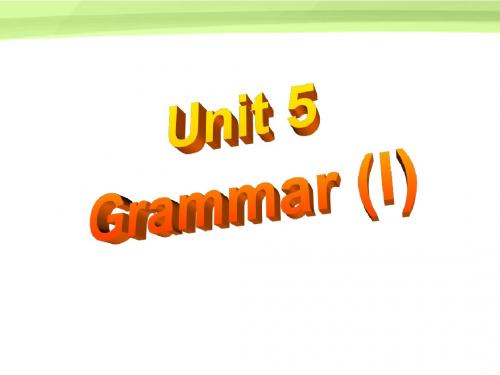
We use the past perfect tense to talk about an action that happened before another action in the past. The earlier action is expressed in the past perfect tense and the later action is expressed in the simple past tense.
1.过去完成时常与 before 等词构成的短语连用。如: 过去完成时常与by, 等词构成的短语连用。 过去完成时常与 1) 到上学期末为止我们已学了三千多个英语单词了。 到上学期末为止我们已学了三千多个英语单词了。
We had learned over 3,000 English words by the end of last term.
4.过去完成时可用在宾语从句中或通过上下文表示。如: 4.过去完成时可用在宾语从句中或通过上下文表示。 过去完成时可用在宾语从句中或通过上下文表示
1)他说他已买了一辆新自行车。 1)他说他已买了一辆新自行车。 他说他已买了一辆新自行车 He said he had bought a new bike. 2) 我同桌告诉我她去过北京两次了。 我同桌告诉我她去过北京两次了。 My partener told me she had been to Beijing trwice.
1)做完作业后,他上床睡觉了。 做完作业后,他上床睡觉了。 做完作业后 After he had finished his homework, he went to bed. 2)当他关了灯后 就锁上门回家了。 当他关了灯后, 当他关了灯后 就锁上门回家了。 When he had turned off the light, he locked the door and went home.
英语七年级上册 Unit 1 Grammar 1【牛津版】【精品课件】1
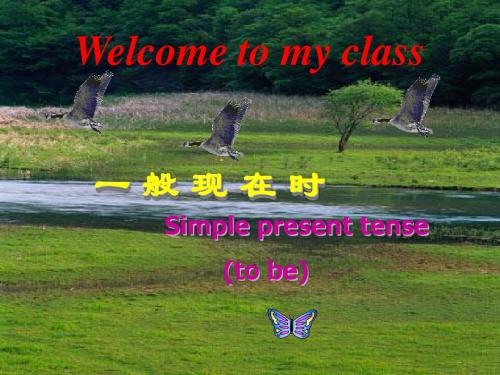
一般现在时
Simple present tense (to be)
Read the new words loudly!
eat maths walking lunchtime day always usually sometimes
-
fish walk fly every drawing weekend run often
总结:Simple present
tense of the verb ”to be”
I am a teacher.
am is are
肯定句 I am… He/she/it is… We/you/they are…
Sandy’s hair is long and black.
否定句 I am not… He/she it isn’t… We are in the classroom. We/you/they aren’t… 疑问句 Are you/we/they……? 表示目前的状态或客观事实 Is he/she/it……?
be 后+形容词
• Sandy is from China. be 后+介词短语 • We are in Class One, Grade Seven. • The girls are behind the trees.
• some exercises .
补充习题 Page5 A1
把下列句子改为否定句:
I _____ he _____ we _____ Amy_____ you _____ she _____ it _____ you _____ they _____ my parents_____
人教版高中英语必修一unit1grammar
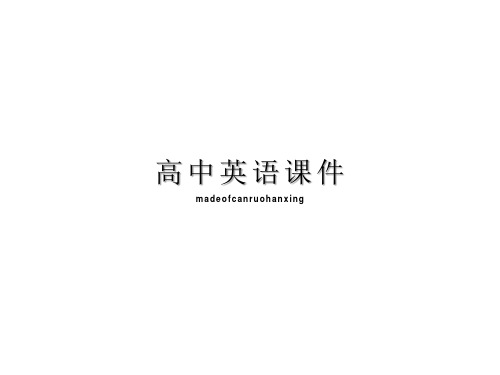
Whenyouchangeasentencefromdirects peechtoindirectspeech,yousometimes needtochangetheverbtense.Youmayal soneedtochangepronouns,timeinorder
tokeepthesamemeaning.
“Idon’tlikecomputers,”Sarahsaidtoherfriends.
Sarahsaidtoherfriends that Idon’tlike
computers. Sarah said
she
didn’t
Sarahsaidtoherfriendsthatshedidn’tlikecomput ers.
he
harvested Theyaskedhimwhenheharvestedthewheat.
选择疑问句
•用whether…or…表达,而不用if…or…,也 不用either…or… • Heasked,“DoyouspeakEnglishorFrench?”
• HeaskedmewhetherIspokeEnglishorFrenc h.
3.Tomsaid“Iwillseeyounextweek.” Tomsaidthathewouldseemethenextweek.
4.“Whywereyoulateagain?”Theteachersaidtome. TheteacheraskedmewhyIwaslateagain.
5.“Idon’tlikeswimming,”saidSarah. Sarahsaidshedidn’tlikeswimming.
一般疑问句
•间接引语用连词whether或if引导,原主句中 谓语动词said要改为asked(me/him/us等), 语序是陈述句的语序
高一英语必修一Unit1Grammar语法直接引语间接引语
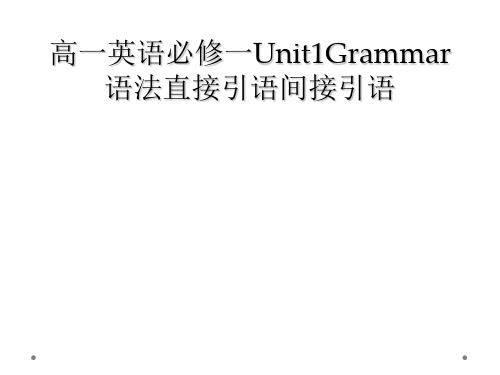
仍用一般现在时。例如: Teacher said to us:" The moon moves round
the earth." Teacher told us the moon moves round the earth. The teacher said to us : “Light travels faster
宾语从句
判断以下哪些句子属于间接引语
She said that she didn’t want to be a teacher. 间接 She said, “I don’t want to be a teacher〞.直接 He said, “ I like playing football〞. 直接 He said that he liked playing football. 间接
3. Mr Black said, “I have walked a long way this week.〞 Mr Black said that __ a long way __. A. I had walked…last week B. he had walked…that week C. I walked…last week D. he has walked…this week
〞 • 间接引语 Mum told me that I could clean my bedroom the next day . • Mr. Smith said,“He is a good worker. ’’ • Mr. Smith said that he was a good worker.
3.人称的变化
• 直接引语里的第一人称和第二人称,变间接引语时,人称要做相 应调整。例如:
九年级英语全册《Unit3 grammar1》课件 人教新目标版
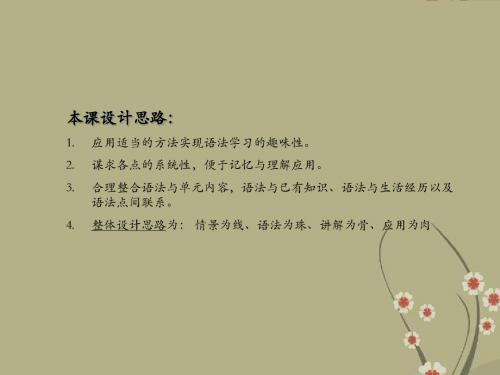
宾语
OC. My parents do not allow me to go out after 6p.m.
宾宾语补足语
More practice
1. The boy promises not to be O for school again. late
宾语
OC. 2. Mr Wu tells the students not to shout in class.
Let’s read the advice and identify the sentence elements.
Chatting time.
It’s time for you to talk with your partner. One of you can just read the problems in A1and the other give the advice in A2. Or you can chat about your own problems. But remember to use “to—infinitives”.
Home work
1. Read the sentences in Part A. 2. Go over the usage of “to—infinitives.
To hand in S homework on time is good.
主语
It is good to hand in homework on time.
I hope to hear from you soon. O
Pred. My dream is to be a great football player.
Why?
You have to.
Unit 1语法Grammar some和any及复合不定代词讲义 牛津深圳版英语八年级上册
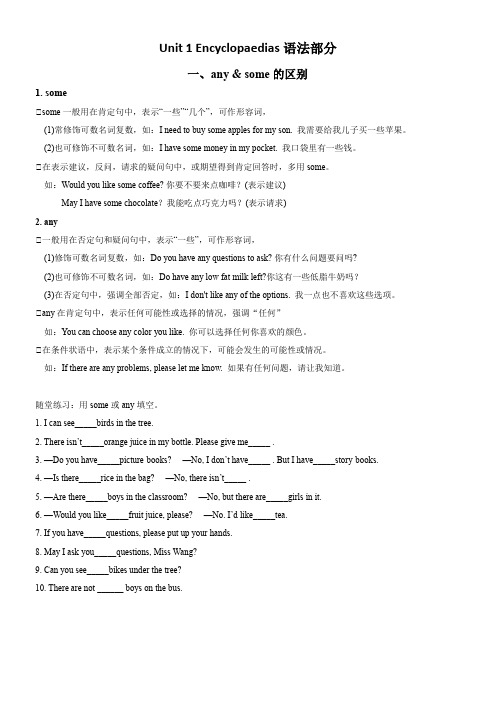
Unit 1 Encyclopaedias语法部分一、any & some的区别1. some①some一般用在肯定句中,表示“一些”“几个”,可作形容词,(1)常修饰可数名词复数,如:I need to buy some apples for my son. 我需要给我儿子买一些苹果。
(2)也可修饰不可数名词,如:I have some money in my pocket. 我口袋里有一些钱。
①在表示建议,反问,请求的疑问句中,或期望得到肯定回答时,多用some。
如:Would you like some coffee?你要不要来点咖啡?(表示建议)May I have some chocolate?我能吃点巧克力吗?(表示请求)2. any①一般用在否定句和疑问句中,表示“一些”,可作形容词,(1)修饰可数名词复数,如:Do you have any questions to ask?你有什么问题要问吗?(2)也可修饰不可数名词,如:Do have any low fat milk left?你这有一些低脂牛奶吗?(3)在否定句中,强调全部否定,如:I don't like any of the options. 我一点也不喜欢这些选项。
①any在肯定句中,表示任何可能性或选择的情况,强调“任何”如:You can choose any color you like. 你可以选择任何你喜欢的颜色。
①在条件状语中,表示某个条件成立的情况下,可能会发生的可能性或情况。
如:If there are any problems, please let me know. 如果有任何问题,请让我知道。
随堂练习:用some或any填空。
1. I can see_____birds in the tree.2. There isn’t_____orange juice in my bottle. Please give me_____ .3. —Do you have_____picture-books?—No, I don’t have_____ . But I have_____story-books.4. —Is there_____rice in the bag?—No, there isn’t_____ .5. —Are there_____boys in the classroom?—No, but there are_____girls in it.6. —Would you like_____fruit juice, please?—No. I’d like_____tea.7. If you have_____questions, please put up your hands.8. May I ask you_____questions, Miss Wang?9. Can you see_____bikes under the tree?10. There are not ______ boys on the bus.二、复合不定代词1.构成2.区别(1)something,somebody,someone通常用于肯定句;anything,anyone,anybody通常用于否定句、一般疑问句或条件状语从句中。
Unit1Grammar课件牛津译林版英语九年级上册
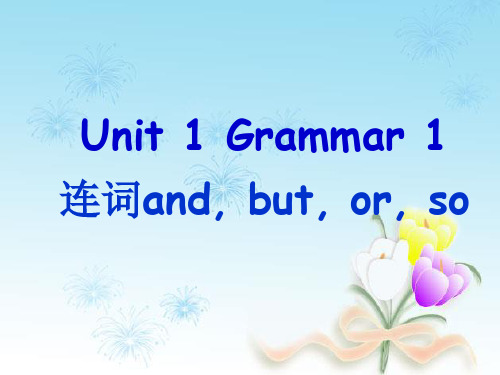
get any milk.
*16. Excuse me, _b_u_t__ could you show me
how to use the machine?
both either neither none all any的用法
I am active and energetic, and I love working with people.
Let’s join the two sentences together.
1. He doesn’t like to talk much. 2. His work shouts!
(but) join two different ideas
◆ We use ‘so’ to express the result of something. Attention: If the two subjects and verbs are the same, we do not need to repeat the first ones when we join ideas together with and, but and or .
两者
三者或三者以上
任何一个
either
any
都
both
all
任何一个都不
neither
none
作不定代词 either/both/neither/any/ all/ of sth. (sb.) 名词复数
both of us neither of the twins either of the two answers
8. — Have you seen Tom and Mary? —No, I haven seen _n_e_it_h_e_r__ of them.
牛津译林版英语九上grammar1
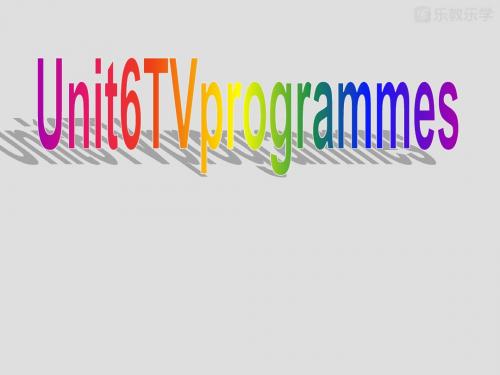
If-clause (simplepresenttense)
Ifyouareafootballfan,
Ifyouareananimallover,
If-clause (simplepresenttense)
Mainclause (will/may/might/…+in finitive)
Ifyouenjoysolvingmyst youmightlikethisfilm. eries,
attackcatchhuntliveprotectwalk
Dad:Whatwilltigersdoiftheyhavebabies? Millie:Tigers(9)___________asafamilyif willlive they(10)____________. havebabies Dad:Whatwillmalewolvesdoifthere’s danger? adj.雄性的 Millie:Malewolves(11)____________their willprotect familiesifthere(12)___________. isdanger
单项选择。 1.If there ________ no buying and selling of animals, there _______ no killing in nature. A. A is; will be B. will be; will be C. is; is D. will be; is
1 Unlesstheweatherreportsaysitis
goingtorain,______c 2Wewillarriveatthestudioaround9:30a. m.,_______ d
牛津译林版八年级英语上Unit1 Grammar1课件

不规则变法
little far old
Complete the table .
adjective funny
good happy
comparative
funnier
superlative
funniest best happiest
better
happier
interesting
large
more interesting most interesting larger smarter redder largest smartest reddest
worst worse bad 最差的 更差的 Which flower is ______, worse this one or that one ? That flower is ________ the ,更糟的 worse adj. 最差的,最糟的 worst n. 高,高度 height /ai/ n. 重量 weight /ei/ n. 秒(=second) Sec. competition n. 竞赛,比赛,竞争 v./n. 测试,考查 test n. 游泳者 swimmer
1. We use comparatives + than to compare two people or things. e.g. Tom is cleverer than Daniel. This film is more interesting than that one.
We add -er / -est after short adjectives. We use more/ most before long adjectives.
zxxk
How tall the woman is!
牛津译林版英语七上U2Grammar(1)
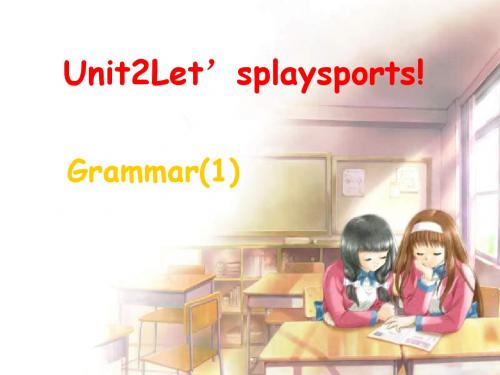
我们用一般现在时谈论事实和状态
•
Weusesimplepresenttense whenwetalkabout:
thingsthat weoftendo
thingsthat arealways true
Milliegetsupat6:30e Catseatfish. verymorning.
be i
2以sh,ch,ss,x和o结尾的动词加es
miss misses finish finishes go goes watch watches fix teach
•
fixes teaches
3.以辅音字母加y结尾的,把y改成ies
fly
flies
study studies
4.以元音字母加y结尾的动词,直接加s say says play plays
•
3.______Amyenjoyreading? Does _____________. Yes,shedoes
4._______Simonlikewalking? Does _____________. No,hedoesn’t
5.______SimonandDaniellovedrawing? Do _____________. No,theydon’t
•
WelcometoSportsClub
TaskOne
TaskTwo TaskThree
TaskFour
•
Negativesetences(否定句)
I/You/ We/They
donot/do n’t
watchballgames.
He/She/It
doesnot/do esn’t
•
Interviewyourpartners
九年级英语Unit 1 Grammar译林出版社知识精讲
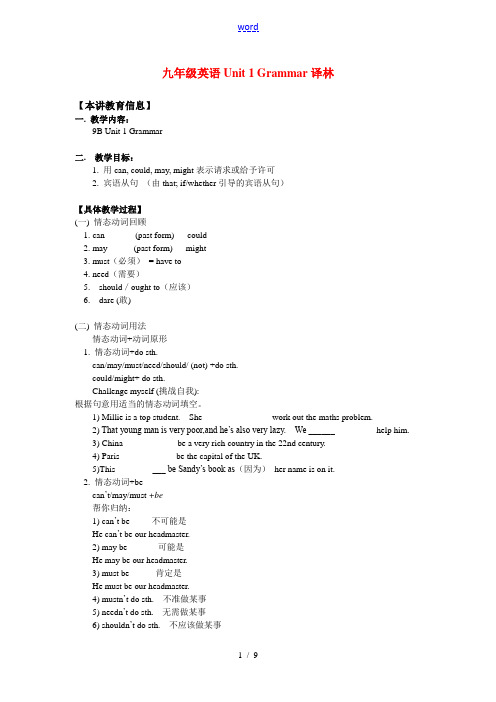
九年级英语Unit 1 Grammar译林【本讲教育信息】一. 教学内容:9B Unit 1 Grammar二. 教学目标:1. 用can, could, may, might表示请求或给予许可2. 宾语从句(由that; if/whether引导的宾语从句)【具体教学过程】(一) 情态动词回顾1. can (past form) could2. may (past form) might3. must(必须)= have to4. need(需要)5. should/ought to(应该)6. dare (敢)(二) 情态动词用法情态动词+动词原形1. 情态动词+do sth.can/may/must/need/should/ (not) +do sth.could/might+ do sth.Challenge myself (挑战自我):根据句意用适当的情态动词填空。
1) Millie is a top student. She _______________ work out the maths problem.2) That young man is very poor,and he’s also very lazy. We _______________ help him.3) China ____________be a very rich country in the 22nd century.4) Paris ____________ be the capital of the UK.5)This ___________ be Sandy’s book as(因为)her name is on it.2. 情态动词+becan’t/may/must +be帮你归纳:1) can’t be 不可能是He can’t be our headmaster.2) may be 可能是He may be our headmaster.3) must be 肯定是He must be our headmaster.4) mustn’t do sth. 不准做某事5) needn’t do sth. 无需做某事6) shouldn’t do sth. 不应该做某事ought not to do sth.比较句意:This may not be true.This cannot be true.Such things may happen.Such things can happen.It must have rained last night.极限挑战:1) The singer must be Pan Weibo. (否定句)The singer ______ (mustn’t/can’t)be Pan Weibo.2) ---Must we catch a bus there?a. (肯定回答)---Yes,you _________. (must/need)B. (否定回答)---No,you __________. (mustn’t/needn’t)You can also go there by bike.3) ---Could you help me with my drawing?---Yes, I could.---No, I couldn’t. (对吗?)小结:情态动词有can(could), may (might),must, shall , should, will (would),ought to, need, dare 等。
译林版高一英语必修第一册(2019版)_Unit1_Grammar_同步练习
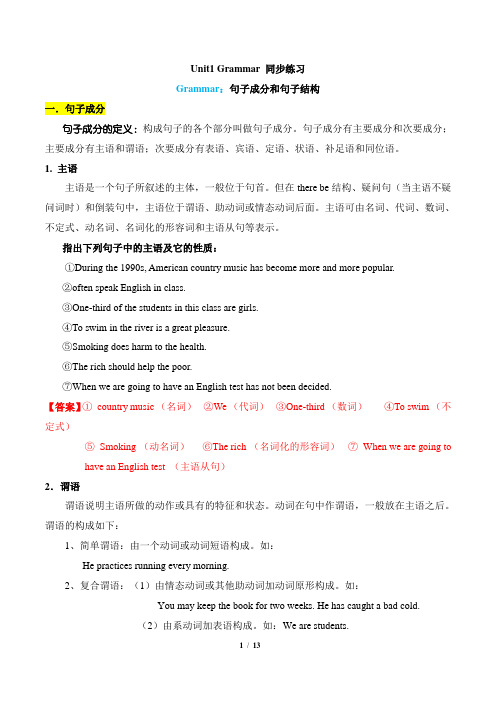
Unit1 Grammar 同步练习Grammar:句子成分和句子结构一.句子成分句子成分的定义:构成句子的各个部分叫做句子成分。
句子成分有主要成分和次要成分;主要成分有主语和谓语;次要成分有表语、宾语、定语、状语、补足语和同位语。
1. 主语主语是一个句子所叙述的主体,一般位于句首。
但在there be结构、疑问句(当主语不疑问词时)和倒装句中,主语位于谓语、助动词或情态动词后面。
主语可由名词、代词、数词、不定式、动名词、名词化的形容词和主语从句等表示。
指出下列句子中的主语及它的性质:①During the 1990s, American country music has become more and more popular.②often speak English in class.③One-third of the students in this class are girls.④To swim in the river is a great pleasure.⑤Smoking does harm to the health.⑥The rich should help the poor.⑦When we are going to have an English test has not been decided.【答案】①country music (名词)②We (代词)③One-third (数词)④To swim (不定式)⑤Smoking (动名词)⑥The rich (名词化的形容词)⑦When we are going tohave an English test (主语从句)2.谓语谓语说明主语所做的动作或具有的特征和状态。
动词在句中作谓语,一般放在主语之后。
谓语的构成如下:1、简单谓语:由一个动词或动词短语构成。
如:He practices running every morning.2、复合谓语:(1)由情态动词或其他助动词加动词原形构成。
九年级上册英语Unit1 grammar知识讲解和练习-译林版(含答案)
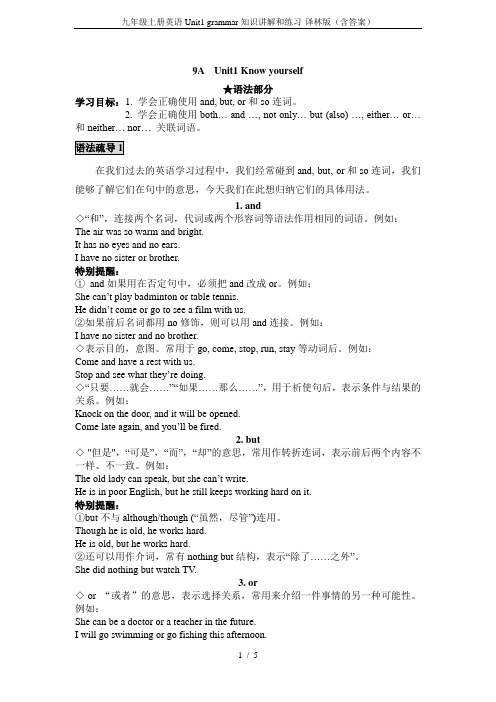
9A Unit1 Know yourself★语法部分学习目标:1. 学会正确使用and, but, or和so连词。
2. 学会正确使用both… and …, not only… but (also) …, either… or…和neither… nor… 关联词语。
在我们过去的英语学习过程中,我们经常碰到and, but, or和so连词,我们能够了解它们在句中的意思,今天我们在此想归纳它们的具体用法。
1. and◇“和”,连接两个名词,代词或两个形容词等语法作用相同的词语。
例如:The air was so warm and bright.It has no eyes and no ears.I have no sister or brother.特别提醒:①and如果用在否定句中,必须把and改成or。
例如:She can’t play badminton or table tennis.He didn’t come or go to see a film with us.②如果前后名词都用no修饰,则可以用and连接。
例如:I have no sister and no brother.◇表示目的,意图。
常用于go, come, stop, run, stay等动词后。
例如:Come and have a rest with us.Stop and see what they’re doing.◇“只要……就会……”“如果……那么……”,用于祈使句后,表示条件与结果的关系。
例如:Knock on the door, and it will be opened.Come l ate again, and you’ll be fired.2. but◇ "但是",“可是”,“而”,“却”的意思,常用作转折连词,表示前后两个内容不一样、不一致。
例如:The old lady can speak, but she can’t write.He is in poor English, but he still keeps working hard on it.特别提醒:①but不与although/though (“虽然,尽管”)连用。
高中英语 Unit1 Grammar课件 牛津译林版必修1
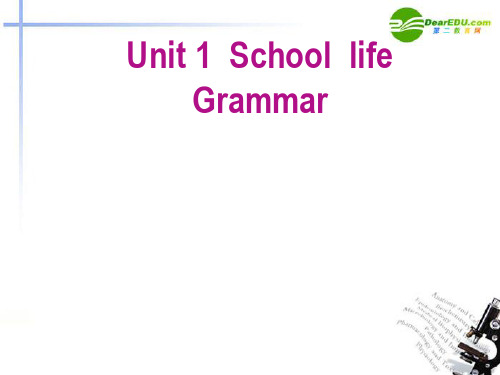
She is an experienced teacher.
二、句 子的种类
1、简单句
(只有一个谓语动词)
2、并列句
(有两个谓语动词以上, 用并列连词连接起来, 他们的地位是平列的)
She is laughing.
主 + 谓(vi)
She opened the door. 主 + 谓(vt) + 宾
that 的特殊用法:
1. 先行词为all everything anything nothing any more one等不定代词(指物) 2. 先行词被all every no some any little much 等词修饰(指物) 3. 先行词被序数词或形容词最高级修饰 或者先行词本身为序数词或最高级。 4. 先行词被the only, the last, the very, the same 等修饰的时候 5. 先行词既有人又有物 6. 主句是以who 或which 等开头的特殊疑问句 7. 关系代词在定于中做表语 8. 先行词为time(次数)和way(方法)时
主谓 一致
1.从句中谓语要注意和先行词保持数和时态上的一致
2. one of …
复数
the (only) one of … 单数
I, who_a_m___ (be) your close friend, will try my best to help you out. He who_d_o_e_s__ (do) not reach the Great Wall is not a true man. Mr. Herpin is one of the foreigners who _a_r_e_ (be) working in China. Mr. smith is the only one of the those foreigners who __is___ (be) working in China.
九年级英语牛津Unit5 Grammar(1)试题

过去完成时学案一.导入1. She ______(live) here for a few years.2.They _________(work) in Guangzhou since 2000.3.I won’t read the book because I _____( read) it before.4.Don’t worry,Mr. Liu _____ already _____(come) back..5.That man_____(see)the doctor,he feels better now.时态________,意义__________________________________________________________________________ 二.呈现:判断下面每个句中哪个事情先发生1.She had put most of her effort into ballet training( ) before entered the film industry.( )2.She had also been a model( )before she became a Hollywood superstar.( )lie got off the bus ( ) because she had left her schoolbag at home.( )4.Simon had lost his football( ),so he went to look for it.( )5.Amy felt sick( )because she had eaten too much ice cream.()先发生的事情用的结构是:________.我们称之为________时态,常和____ ,____ ,_____等词连用。
意义为:________________________________________________________________,即___________。
译林版英语九年级上册_Unit1_Grammar名师教案
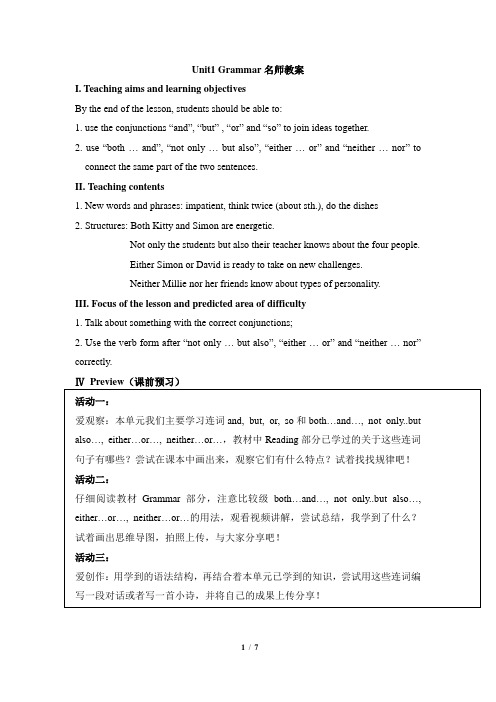
Unit1 Grammar名师教案I. Teaching aims and learning objectivesBy the end of the lesson, students should be able to:1. use the conjunctions “and”, “but” , “or” and “so” to join ideas together.2. use “both… and”, “not only… but also”, “either… or” and “n either … nor” to connect the same part of the two sentences.II. Teaching contents1. New words and phrases: impatient, think twice (about sth.), do the dishes2. Structures: Both Kitty and Simon are energetic.Not only the students but also their teacher knows about the four people.Either Simon or David is ready to take on new challenges.Neither Millie nor her friends know about types of personality.III. Focus of the lesson and predicted area of difficulty1. Talk about something with the correct conjunctions;2. Use the verb form after “not only… but also”, “either… or” and “neither… nor” correctly.ⅣPreview(课前预习)活动一:爱观察:本单元我们主要学习连词and, but, or, so和both…and…, not only..but also…, either…or…, neither…or…,教材中Reading部分已学过的关于这些连词句子有哪些?尝试在课本中画出来,观察它们有什么特点?试着找找规律吧!活动二:仔细阅读教材Grammar部分,注意比较级both…and…, not only..but also…, either…or…, neither…or…的用法,观看视频讲解,尝试总结,我学到了什么?试着画出思维导图,拍照上传,与大家分享吧!活动三:爱创作:用学到的语法结构,再结合着本单元已学到的知识,尝试用这些连词编写一段对话或者写一首小诗,并将自己的成果上传分享!【备注:学生登录“优教·同步学习网”完成本课时预习任务,教师可通过备课端查看预习结果反馈,针对性进行课堂教学】Ⅴ.Teaching proceduresA Using and, but, or and soStep 1 Lead inFree talkT: Today, we’ll learn Grammar of Unit 1.We’ve met four outstanding persons. Do you remember them? (Show the pictures of the characters we’ve learned)S: They are Wu Wei, Su Ning, Liu Tao and Fang Yuan.T: Among them, I admire Wu Wei best because I wanted to be an artist when I was young.【设计意图:通过复习Reading中人物,导入新课,利用已有知识过渡至新板块的学习,使学生迅速进入学习状态。
英语:module1 grammar教案(外研版必修2)
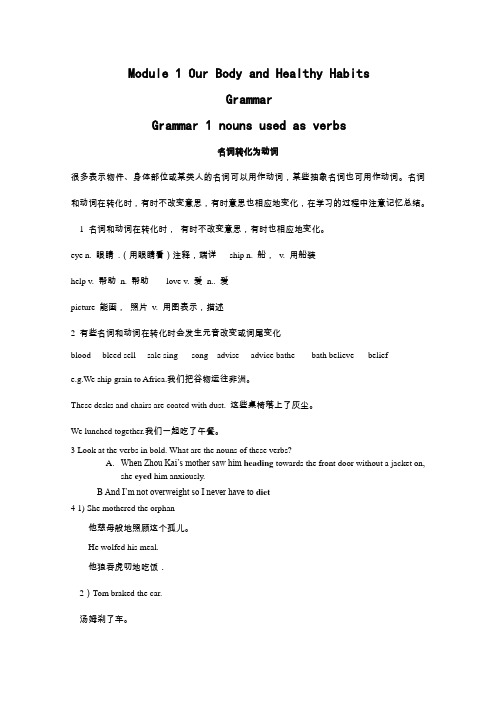
Module 1 Our Body and Healthy HabitsGrammarGrammar 1 nouns used as verbs名词转化为动词很多表示物件、身体部位或某类人的名词可以用作动词,某些抽象名词也可用作动词。
名词和动词在转化时,有时不改变意思,有时意思也相应地变化,在学习的过程中注意记忆总结。
1 名词和动词在转化时,有时不改变意思,有时也相应地变化。
eye n. 眼睛.(用眼睛看)注释,端详ship n. 船,v. 用船装help v. 帮助n. 帮助love v. 爱n.. 爱picture 能画,照片v. 用图表示,描述2 有些名词和动词在转化时会发生元音改变或词尾变化blood----bleed sell----sale sing---- song advise----advice bathe----- bath believe---- beliefe.g.We ship grain to Africa.我们把谷物运往非洲。
These desks and chairs are coated with dust. 这些桌椅落上了灰尘。
We lunched together.我们一起吃了午餐。
3 Look at the verbs in bold. What are the nouns of these verbs?A.When Zhou Kai’s mother saw him heading towards the front door without a jacket on,she eyed him anxiously.B And I’m not overweight so I never have to diet4 1) She mothered the orphan他慈母般地照顾这个孤儿。
He wolfed his meal.他狼吞虎叨地吃饭.2)Tom braked the car.汤姆刹了车。
英语《Seasons》Grammar[1]PPT公开课件
![英语《Seasons》Grammar[1]PPT公开课件](https://img.taocdn.com/s3/m/476fb05bbceb19e8b9f6ba92.png)
•
。而另外总有一些人会运用自己的心 智去分 辨哪些 快乐或 者幸福 是必须 建立在 比较的 基础上 的,而 哪些快 乐和幸 福是无 需比较 同样可 以获得 的,然 后把时 间花在 寻找甚 至制造 那些无 需比较 就可以 获得的 幸福和 快乐, 然后无 怨无悔 地生活 ,尽情 欢乐。 一位清 洁阿姨 感觉到 快乐和 幸福, 因为她 刚刚通 过自己 的双手 还给路 人一条 清洁的 街道; 一位幼 儿园老 师感觉 到快乐 和幸福 ,因为 他刚给 一群孩 子讲清 楚了吃 饭前要 洗手的 道理; 一位外 科医生 感觉到 幸福和 快乐, 因为他 刚刚从 死神手 里抢回 了一条 人命; 一位母 亲感觉 到幸福 和快乐 ,因为 他正坐 在孩子 的床边 ,孩子 睡梦中 的脸庞 是那么 的安静 美丽, 那么令 人爱怜 。。。 。。。
Seasons
Grammar 2
Birdwatching
1. Zhalong looks beautiful.
2. WeScan seVe manyPbirds.
3.
SSome
peVople
O
are watching
birds.
4.
TheyS are
V
birdwatchers.
O
5. BirSdwatVching is Pinteresting.
弄
五
分
钟
就
弄
完
所
以
最
后
通
常
变
成
我
自
己
弄
。
但
这
样
做
有
一
个
不
好
的
后
果
就
是
- 1、下载文档前请自行甄别文档内容的完整性,平台不提供额外的编辑、内容补充、找答案等附加服务。
- 2、"仅部分预览"的文档,不可在线预览部分如存在完整性等问题,可反馈申请退款(可完整预览的文档不适用该条件!)。
- 3、如文档侵犯您的权益,请联系客服反馈,我们会尽快为您处理(人工客服工作时间:9:00-18:30)。
• 2)I don’t believe she’s a singer, __________?
• 2.there be 句型 • 3. everything, something, everybody,
Had+ 过去分词
Should/would/could/ might+ have+过去分词
动 词 过 去 式 , Should/would/could/ (should+) 动 词 原 形 , might+动词原形 were to + 动词原形
• 2. 省略if 的虚拟条件句 如果从句中含有were, had 或should词时,可将if省
• 3. none, some, any, more, all, most 等做主语时,动词的单 复数由其指代的词的单复数决定。
• 4. every, each, either, neither, one, another, little , a little, much做主语或修饰主语时,谓语动词通常用单数。
• 3. Postdeterminer 基数词;序数词;next, last ,other another, many, a few, little, more, most; several, plenty, a lot, a great deal of, a small amount of; such …
Tag Question +Subjunctive Mood +
Modal Auxiliary
Tag Question
• 1. 陈述部分是主从复合句,附加疑问部分应 与主句的主语和谓语动词一致;当陈述部分是 第一人称主语+think, believe, expect, suspect等结构式,附加疑问句往往与并与从 句的主语和谓语保持一致,但注意否定转移。
• 1. Predeterminer all, half, both;倍数;分数;what an, such an…
• 2. Central Determiner 冠词;指示代词;人称代词;名词属格;不定代 词(some, any, no, each, every, either…);what, whose, which…
nobody…
• 4. 祈使句(imperative sentence),will you, won’t you, shall we?
• 5. 句子含有have相关词汇,表示有,可用have,也 可用does…;不表示“有”,用其他。
• 6.情态动词 must have,肯定,一定,根据上下文推测具体情况。
Sentence eplement (subject complement, object complement)
• subject • object • predicative • attribute • adverbial • appositive
Determiner (18)
“前位+中位+后位” ,后位可叠加
• e.g. Which of the following is INCORRECT? • A. All his lectures were boring. • B. Half his money was gone. • C. Her few friends are all fond of singing. • D. He invited many his friends to the party.
Subject-verb agreement (12)
• 1. 主语加with, together with, including, as well as, except, more than, along with,…等,谓语和前面主语一致。
• 2. 当or, either…or, neither…nor, not only… but also连接两 个以上主语时,谓语采用就近原则。
• 5.would rather, would sooner, might as well, would prefer 之后用虚拟语气表示愿望。
• 现在或将来:过去式 • 过去:过去完成时
Modal Auxiliary
• Need, dare • 1. 情态动词 • 1)Need we go to class on this weekend? • Yes, we must./No, we needn’t. • 2) I dare not walk beside him. • 2.实义动词 • 1) You need a computer, don’t you? • 2) He doesn’t dare to hold her hand.
去,把were, had 或should等提到主语之前, 引 起倒装。
3.错综时间虚拟条件句 有时候,条件从句表示的动作和主句表示的动作发生
在不同的时间,比如一个是过去,一个是现在。则 主句和从句根据各自的不同时间选择适当的虚拟语 气。 If I had listened to you, I would not feel so sad now.
You must have missed the bus, didn’t you?
Subjunctive Mood
• 1. if 非真实条件句的基本用
假设法类型
条件从句谓语动词形式 主句动词谓语形式
与现在事实相反 与过去事实相反 与将来事实相反
动词过去式(be用were) Should/would/could/ might+动词原形
• 4. it is + 形容词/名词/过去分词+that 引导的 主语从句,主语谓语用should+动词原形
• important, necessary. urgent, vital… • a pity, a shame, no wonder that • desired, suggested, demanded…
